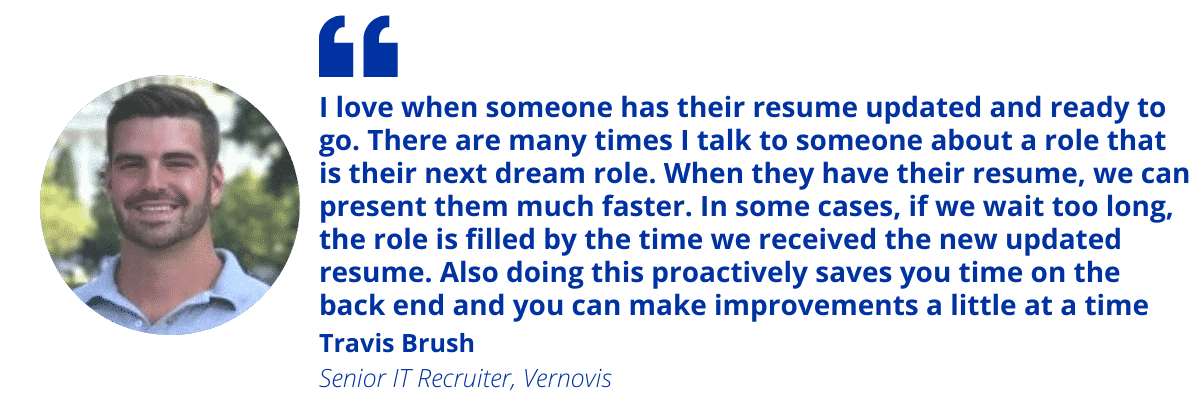
Thinking of an IT Career Shift? Tech Recruiters Offer Real Advice
Think back to when you completed your degree, diploma or IT certification program. Wouldn’t it have been nice if someone had provided you with a nice, clear guide to navigating your tech career? Since information technology evolves so quickly, it’s hard to predict how the landscape will change. Perhaps you’ve discovered a new specialty that piques your interest, or you’d like to shift into a new industry that needs your expertise. Maybe you see that your current specialization is in danger of becoming obsolete, so you want to focus on something new.
When you are faced with a crossroads in your tech career, what do you do?
We talked to our IT recruiters to gather some advice you can use when you’re attempting to navigate an IT career shift.
You Are in Charge of Your Own Tech Career Path
An important factor to remember when you’re thinking about making a change in your IT career is that no one cares more about your success than you do. Tech job recruiters certainly want to see you succeed, but in order to achieve your goals, you have to take control of your career. You can seek advice and guidance, but you control the path you take towards success.
Educate yourself, prepare yourself and be ready to do things like earn new certifications, choose non-traditional jobs to gain exposure and experience or even take a temporary step backward. Be prepared to build strategic relationships with mentors, industry leaders and tech recruiters, but also remain self-assured and confident in advocating for yourself at each step of your journey.
“When I’m talking with a candidate, a great way to determine what they’re truly looking for next is to first ask what their dream job is and then follow up by asking what the next stepping stone to that goal would be. This method forces them to think practically and then verbalize a realistic next step in their career,” says Tony Sammond, Senior IT Recruiter at Vernovis.

Don’t Wait Until You Need an IT Job To Look For One
If you know you need to make a move because your specialty is shrinking or the industry you work in is experiencing rapid change, don’t wait until you need a job to make a career change. There are always new opportunities you can take advantage of in the tech sector. So as you’re thinking about the things you need to do to make a successful shift, if you do find a good information technology job that could be a bridge for you, jump on it. The last thing you want to do is to be caught without a job. The great irony of a job search is that it’s always easier to find a job when you have a job – even in the tech sector.
Travis Brush, Vernovis Senior IT Recruiter, shares, “Technology is always improving, you should too. Many of the relationships that I make are with people passively looking. While they are not in dire need of making a move, they are able to get ahead of the curve and weigh all their options without the fear of being without an income. This leads to better, more informed decisions on their next role.”

Be Clear on Your IT Career Goals
Before you can navigate a tech career shift, you must know what your goals are. There’s an old saying attributed to Yogi Berra, “If you don’t know where you’re going, you’ll end up somewhere else.” And that’s true when it comes to your IT career path. You can’t navigate a shift if you don’t know where you are navigating to.
So first, be clear about your goals.
- Do you want to change tech specializations?
- Would you like to stay in the same specialization but advance your IT career?
- Do you want to stay in the same specialization but change the industry you work in?
When you are clear about your end goal, you can much more easily break down the steps you need to take to reach that goal.
Tips for Making an IT Career Change
If you’re interested in changing tech specializations or making a career shift, you’re not alone. Many IT professionals discover new interests throughout the course of their careers, and in some cases, tech pros see the writing on the wall and know that their area of focus won’t be in-demand in the coming years (just ask Visual Basic coders from the 1990s).
Use these tips to navigate an IT career shift.

Identify and Address Skill Gaps
The first step in changing specializations or advancing your tech career is to assess your current skill set against the skills required to get a job in your target field. Identify the skills that you have that are transferable, and then make a list of the skills you need to acquire.
Once you’ve identified your gaps, you’ll need to develop a plan to close them. Study up on your target specialty. Read job descriptions and talk to others in that field. Can you earn certifications to break into this new area? Will a full degree change be required? Do you have the financial budget and time budget to devote to the learning that may be required?
Once you’ve completed an honest assessment of where you are today and what you need to do to make a change, develop a plan to get there.
Understand Whether a Temporary Step Backward May Be Necessary
Once you understand the requirements of the job and what you will need to invest in terms of time and money on getting there, you’ll want to be honest about whether your first move may require a step backward and/or a potential pay cut.
If you’re looking to leave a specialty in which you’ve become a seasoned expert, switching to something new may very well require you to start from the bottom or start a few steps backward from where you are today.
Taking a step back is nothing to be ashamed of, but you want to be realistic about your tolerance level. If you can’t afford a pay cut, that particular shift may not be right for you. If your ego won’t recover from moving back, you may want to reconsider.
As you evaluate whether a shift in specialization is worth it, remember that if a step back or a minor cut in pay are required, they are only temporary, and you will work your way back up.
Keep Your Resume and LinkedIn Updated
As you progress through your educational journey to close your skill gaps, make sure to update your resume and LinkedIn profile in real-time. Why? Because tech job recruiters are always on the lookout for talented people, and you never know when someone will have a job that you’re qualified for even before you complete your education.
“I love when someone has their resume updated and ready to go. There are many times I talk to someone about a role that is their next dream role. When they have their resume, we can present them much faster. In some cases, if we wait too long, the role is filled by the time we received the new updated resume. Also doing this proactively saves you time on the back end and you can make improvements a little at a time,” says Travis.

Keep in Touch With Tech Recruiters
Again, you never know when a tech recruiter will have an opening or a project that is perfect for you in your new journey, so if recruiters do reach out to you, give them a chance. Explain your current situation and your long-term goals and check in now and then and update them on your education or certification progress. Checking in keeps the relationship going and keeps you top-of-mind if they come across anything that might be a good entry point for your IT career shift.
“As a recruiter, I often reach out to candidates about a specific role, if that feels like the right fit for them, then great! But I really use this as a starting point to a long-term relationship focused on their entire career journey and professional goals. I enjoy connecting with candidates and learning more about what they are looking for and why” shares Maggie Huggins, Senior Professional Recruiter with Vernovis.

Consider “Non-Traditional” IT Career Paths
A great way to gain experience in a new specialization is to open yourself up to contract IT jobs and IT consulting jobs. Employers hire IT contractors and consultants when they need to close skill gaps on their team, or they have short-term projects. These jobs can range from a few months to a few years.
IT contract and consulting jobs allow tech pros to focus on their core skills and competencies. In some cases, they can be a terrific way to start gaining experience in a new specialization or industry while earning great money. Some tech pros love contracting and consulting so much, they never go back to a “traditional” full-time job. They like the variety of work environments that comes with this type of project-based work, they enjoy taking time off in between contracts to recharge their batteries, and they love the fact that they get to focus on their best skills.
Another bonus of working IT contracts and consulting jobs comes with partnering with an established tech recruiting firm like Vernovis; you can be eligible for benefits like a 401(k), medical benefits and paid holidays – just like at a “traditional” full-time job. Your recruiter can also help you line up your next contract and help to ensure that you are always advancing your career.
Vernovis’ IT Recruiter, Jonathon Juriga, shares that “At Vernovis, I love helping my consultants find projects that fuel their passion, build lasting relationships with our clients, and gain experience to elevate their careers.”

Are You Ready To Change or Advance Your IT Career?
If you are an experienced tech professional that is in the process of changing specializations or industries, if you’re looking to advance your career or leverage consulting opportunities, we invite you to connect with the IT recruiters at Vernovis. We are a top tech recruiting firm based in Cincinnati that serves information technology job seekers across the U.S. We partner with employers in a variety of sectors that are hiring for both full-time roles and contract/consulting roles.
Browse our current job openings or contact us to learn more about the ways we can help you achieve your IT career goals.






